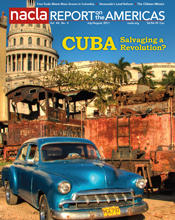Current Issue

In this issue, we consider the new economic reforms announced by the Cuban leadership that aim to resuscitate a floundering economy that, as noted in the Introduction to the issue, “is incapable of producing the minimum supply of goods, services, and tax revenue needed to provide for the basic needs of the population.” What are the implications that Cuba’s new economy will have for social policy? How has the legacy of the Special Period in Cuba not only changed many Cubans’ attitudes toward their lives but also opened up new cultural spaces for expression and participation? What is the latest assessment of racial equality and gay tolerance on the island? Have U.S.-Cuban relations under the Obama administration been a case of missed opportunities for improvement? This issue of the NACLA Report on the Americas attempts to answer these important questions and more.


